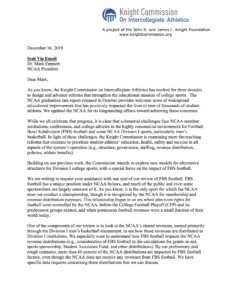For Public Release
Dec. 16, 2019
 The Knight Commission on Intercollegiate Athletics, a leading voice for college sports reform, informed NCAA President Mark Emmert today that it will examine new models to restructure college sports, citing the challenges created by the “highly commercialized environment” for Football Bowl Subdivision (FBS) football and some NCAA Division I sports, particularly men’s basketball.
The Knight Commission on Intercollegiate Athletics, a leading voice for college sports reform, informed NCAA President Mark Emmert today that it will examine new models to restructure college sports, citing the challenges created by the “highly commercialized environment” for Football Bowl Subdivision (FBS) football and some NCAA Division I sports, particularly men’s basketball.
Commission Co-Chairs Arne Duncan and Carol Cartwright wrote in the letter to Emmert that the Commission intends to explore “alternative structures for Division I college sports, with a special focus on the impact of FBS football.” The Commission is seeking far-reaching reforms that will better prioritize student-athletes’ education, health, safety and success.
In an appearance last week at a Sports Business Journal conference in New York, Duncan offered some restructuring ideas that might be explored. For example, big-revenue athletics programs might be placed in a new division or organized and managed outside of the NCAA.
“Just let them play by a different set of rules – and be upfront about it and be honest about it,” said Duncan, the former U.S. Secretary of Education.
The existing structure of the NCAA “works extraordinarily well for 95, 96, 97 percent of students and schools,” Duncan said, but he warned that in Division I revenue sports, the relentless quest for more dollars has driven things “absolutely out of whack, and the best interests of students has been lost.”
In their letter to Emmert, Duncan and Cartwright note that FBS football is the only sport for which the NCAA doesn’t conduct a championship, even though FBS football is recognized by the NCAA for membership and revenue distribution purposes. The two co-chairs wrote that the Knight Commission review will not only examine the broad impact of FBS football but will also assess how FBS football impacts NCAA revenue distributions, which come from the NCAA’s Division I men’s basketball tournament.
Over the past two decades, the Knight Commission has helped propel major reforms in college sports, including the addition of independent directors to the NCAA’s highest governing body, the creation of an academic threshold for postseason play that requires teams to be on track to graduate at least half of their players, and the inclusion of hundreds of millions of dollars in academic incentives in the NCAA’s March Madness revenue distributions.
###
About the Knight Commission on Intercollegiate Athletics
The Knight Commission was formed by the John S. and James L. Knight Foundation in October 1989 to promote reforms that prioritize student-athletes’ education, health, safety, and success. Over the years, the NCAA has adopted a number of the Commission’s recommendations, including the rule that requires teams to be on track to graduate at least 50 percent of their players to be eligible for postseason competition. The Commission’s College Athletics Financial Information (CAFI) database provides financial data for more than 220 public Division I institutions, creating greater financial transparency on athletics spending.
About the John S. and James L. Knight Foundation
The Knight Foundation supports transformational ideas that promote quality journalism, advance media innovation, engage communities, and foster the arts. We believe that democracy thrives when people and communities are informed and engaged. For more, visit http://www.kf.org/.
